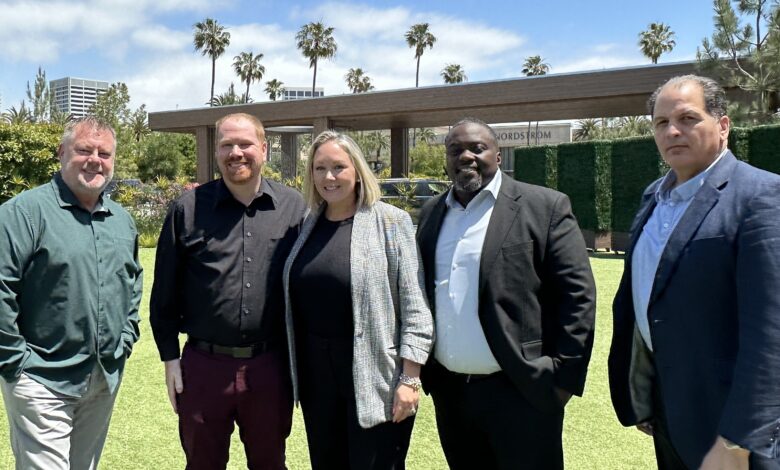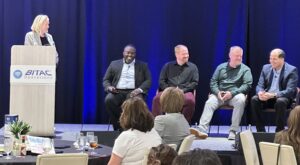
BITAC Operations 2025 Panel: Transforming Hospitality with AI
By Jim Nelson | May 12, 2025
NEWPORT BEACH, CA — Each year, Hotel Interactive gets together with its sister company, BITAC, to put on our Operations executive event. This year, we recently gathered in this Southern California beach community, where one of the panels explored AI and how it’s transforming the hospitality profession.

Sondra Richardson, the VP of operations at Oliver Hospitality moderated the panel, which featured Adam Butts, VP of procurement operations & systems at Crescent Hotels and Resorts; Adam Jackson, VP hotel operations for Jackson Hotel Management; Kris Milligan, VP of operations for Heart of America Group; and Anthony Nieves, a principal managing member who handles strategic planning and operations support at ProcurLogic.
Moderator Richardson began with a question about how AI is transforming the guest experience and shaping new expectations in hospitality.
ADAM BUTTS: Every time I go to my coffee shop near me, they know my name, they know exactly what I want. I don’t even have to order anymore; I walk in, and they have what I need ready. Using AI to personalize the guest experience, using the data and analytics to find out what their preference is, so when they get to their hotel, they’re seeing the things that they want — one, they’ll come back; two, they would be more willing to spend more money because you know exactly what they want. AI can bring all of this data together to give the guests the experience that they want: someone to know their name, so to speak, along with what they want.
ADAM JACKSON: The companies in this room are bringing AI to our guests, helping us make better customers. Many customers don’t want to deal with the front desk, they don’t want to deal with the employee; they want to check in mobiley. They want a chatbot to find an answer. They don’t want to call the front desk. They want to text a number and just say, “What time does the pool open?”
KRIS MILLIGAN: It’s an exciting time — probably the most exciting time in the hotel industry since online reservations. Of course, it goes both ways. We as operators want to try the newest, best thing, and it’s almost like we’re drinking from a firehose. So, I think our challenge is how do we balance the wants versus the needs?
ANTHONY NIEVES: We talk about guest experience and the profile of an individual customer, and what it means to me is being able to — no matter where I travel around the globe — have my expectations met based on my specific needs, whether I want to hit the front desk for that visit versus bypassing it and just going directly to my room, having my room set up the right way, whether it’s king bed, corner room away from the elevator, all the different nuances that make your experience as an individual traveler that much better, and having that predictive versus reactionary is where AI comes in.
SONDRA RICHARDSON: How are we using AI to make hospitality operations more efficient and deliver a more tailored guest experience?
AB: The biggest expense at hotels, and most industries, is employees. So, utilizing AI to be able to make better schedules, to look at the seasonality of things, look at more predictive analysis to be able to have the right people on staff ready to work, comparing what you need to their availability, and really coming out with a schedule that fits the hotel and making sure that you’re not over scheduling or under scheduling. AI can really help measure and monitor, and just make sure you have the right staff, but that’s coupled with training because you can have the right people [but if] they’re not trained you have an even bigger problem.
The other thing AI can do is make sure you have the right training and be able to monitor their training. Turnover is one of the things to happen quite a bit, so training is necessary. To use AI to help with the training and then use that trained staff and have them scheduled accordingly is one of the big things that AI brings to the table.
AJ: Certainly, saving money is a huge benefit. The other side is making money, so we’re able to use AI on revenue management, and it’s a huge aspect; [it’s] shopping the rates five times a day for us to make sure we’re selling the right room at the right price; 15 years ago, I was setting a rate today for next year, and I wasn’t touching it again.
SR: That’s a great point. People are so often scared that it’s going to take away the human component, that it’s this very delicate dance that we do; [this] idea is a great example of that: dynamic pricing. They’re changing instantaneously throughout the day at any given time. By no means is this to replace the human component; this is to elevate what you already have in place.
AN: What we need to see going forward is, how do we leverage AI to be more predictive, rather than looking at it reactionary, after the fact. We see it with PAR (periodic automatic replenishment) levels, we see it with ordering quantities, reducing the margin of error, overstock, expense management, strategic planning, when it comes to sourcing. We can have a five-year plan for commodity categories, but how do you utilize it? And then how do you get updates in a real-time fashion? That’s where your expense management comes into play.
SR: How can we make sure AI improves — not replaces — the human touch, while also tackling challenges like privacy, bias, our guests’ trust, and our over reliance?
AB: One of the things about AI that makes it so efficient is the fact that it takes information and aggregates it all together to give you the best responses. Part of the challenges with that is I don’t want my company information out there for everybody else. Right now, the only way I can get the data I’m looking for is if I add it along with the other data that’s out there, and then it gives me the results. I think that’s more of the evolution of AI: How can we take our company information, use AI to give us some answers so we can make some decisions, without the rest of the world seeing it?
KM: In Gmail, you type up an email, click the bottom — Gemini — and it’s going to reformat your email to be this much more elegant, well-written email, which is amazing, but where’s that going? Is Google now taking all that data that you’re giving them and using it? I don’t really know. And ChatGPT can create such amazing things for you per what you’re giving it. Where’s all that going? Who else can see and use that ChatGPT information?
KM: The Godfather of AI [Geoffrey Hinton] is making the media rounds right now warning us that there’s a 10 to 20 percent chance that AI will overtake humanity. So, there’s that. His analogy is that you can think of AI as a young, cute lion cub that you’re raising, but you can’t ensure that it’s not going to eat you. In our industry, I think the pendulum will swing; I think we’re probably going to go heavy AI, and it will swing back because I don’t care what you do in our industry, you cannot replace the human element.
AN: You have to balance the high tech versus the high touch. You can’t look for it to just replace humans, you have to look at it to do things more accurately and to have it done expeditiously. The key thing is not to use AI to focus on areas where you already have expertise, but to focus on the areas where you have a shortfall. Getting back to the question about ethics and confidentiality, don’t use proprietary information. Speak in general terms, use the parameters and in a generalization so that you’re not compromising any competitive advantage, proprietary information, confidentiality — that’s critical.
SR: Where do you see AI being the biggest impact in the next five years?
AB: Going back to our biggest expense, to cut that down will increase profit. So how can we use AI to cut back on labor — not eliminate — or at least make it more efficient? In airports, you see this Amazon thing where you put [in] your credit card and you walk through, you pick up whatever you want, and then you walk out. It’s very expensive, but it’s very efficient, and we can do certain things like that in a hotel. How can we allow the guests to help themselves, to do certain things and not have to have so much oversight? We can cut down on the labor a little bit without eliminating people; that’s what we’ll see [in] the next five years.
AJ: One thing we were talking about yesterday was the self-driving cars in San Francisco; that could come to the hotel industry on the shuttles — you won’t need a shuttle driver anymore.
KM: Revenue management, accounting, is going to really see a change in the next couple of years with AI. Marketing, all the things that are above operations, I think, are going to see a big shake up with AI. That’s not to say that we’re not going to have robots cleaning our floors. I got a text from one of my engineers showing me robots folding towels. It will happen, but I think that where we’re going to see the biggest impact in AI in our industry is behind the scenes.
AN: One single login to be able to navigate all of the technology solutions that exist for operating a property and having that to where a person can just speak to it and bring that up in front of them.
AB: That second expense, being the actual expense of buying certain things right now, is a heavy dependence on staff to buy certain things based on their judgment. So, using AI to establish PAR levels or to make sure they’re compliant, having it where if they’re trying to buy something outside of the program, it lets them know immediately that this is not compliant. I think that’s one of the key things, making sure they’re buying the right products at the right price so we can meet certain compliances that we’re looking for when it comes to product. Right now, we find out 45 days later that you did the wrong thing.





Get involved!
Comments